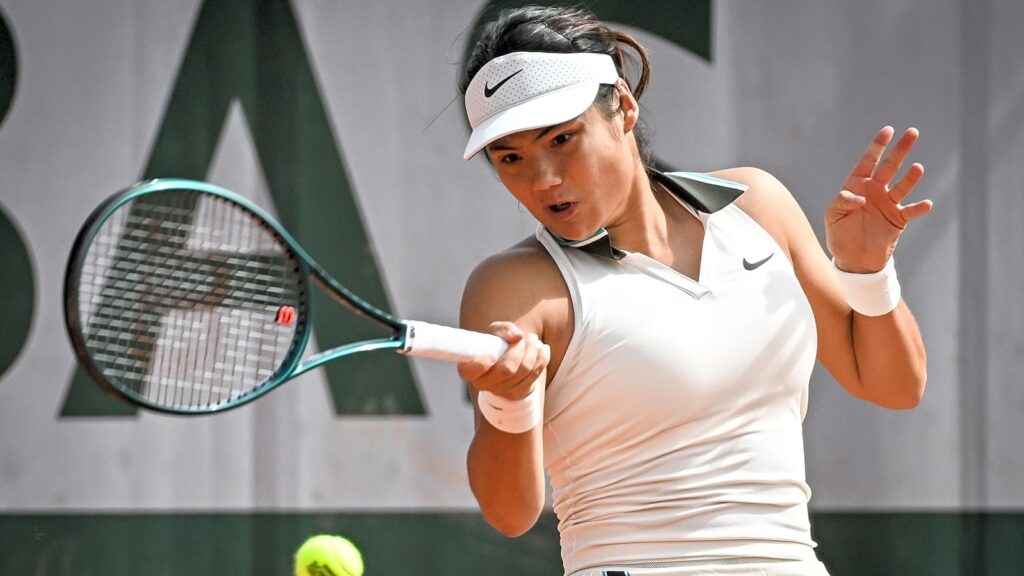Iga Swiatek continued her dominant run at the French Open with a commanding 6-1, 6-2 victory over Emma Raducanu, reinforcing her pursuit of a historic fourth consecutive title at Roland Garros. The defending champion showed no signs of vulnerability as she dismantled the British player in just over an hour on Court Philippe-Chatrier, extending her flawless record against Raducanu to 5-0.
Swiatek’s performance was a masterclass in precision and power, underlining why she is considered one of the toughest competitors on the tour, particularly on clay. Her remarkable record at the French Open now stands at an extraordinary 37 wins to only 2 losses, with 33 of those wins coming in straight sets. This level of consistency is unmatched in the women’s game, emphasizing Swiatek’s status as the tournament’s overwhelming favorite.
Raducanu, just 22 years old and still developing her game, faced one of the greatest challenges of her career in facing Swiatek. After stressing recently the importance of regularly competing against the very best players to improve, Raducanu found herself overwhelmed by the relentless pressure and superior shotmaking of her opponent. Despite a promising start to her service games, the Briton struggled to maintain control once Swiatek began to dictate rallies with her heavy topspin and tactical brilliance.
From the outset, Swiatek imposed a suffocating style of play, forcing Raducanu into defensive positions where she was unable to execute her game plan. The Pole’s heavy forehand repeatedly pushed Raducanu out wide, robbing her of the chance to attack effectively. Attempts by Raducanu to step inside the court and take the ball early were thwarted by Swiatek’s exceptional court coverage and depth of spin, which pushed the ball out of Raducanu’s optimal striking zone.
Swiatek’s ability to absorb pressure and maintain relentless consistency was evident throughout the match. Every time Raducanu tried to seize control, Swiatek’s defense held firm, turning defense into offense seamlessly. The intensity of the baseline exchanges and the accuracy of Swiatek’s shot placement gradually wore Raducanu down, leading to unforced errors piling up on the Briton’s side.
While it was a tough afternoon for Raducanu, the experience highlights the significant gap between emerging talents and the established elite in women’s tennis. Raducanu’s progress over recent months, particularly on clay, has been notable, and she is set to re-enter the top 40 rankings. The grass-court season ahead offers her a chance to build confidence on a surface that better suits her aggressive style and could help her stage deeper runs in future tournaments.
Meanwhile, other top seeds also made strides at Roland Garros. Aryna Sabalenka, the tournament’s top seed and a fierce rival of Swiatek, followed suit with a convincing 6-3, 6-1 win over Jil Teichmann, advancing comfortably to the third round. In the men’s draw, defending champion Carlos Alcaraz also maintained momentum with a 6-1, 4-6, 6-1, 6-2 victory over Fabian Marozsan.
However, not all top players enjoyed smooth progress. Casper Ruud, a two-time French Open finalist and seventh seed, was unexpectedly defeated by Portugal’s Nuno Borges in four sets. Ruud later revealed he had been dealing with a persistent knee injury, which affected his movement and performance. Despite efforts to manage the pain and prepare for the tournament, certain movements on court exacerbated the discomfort, likely impacting his play.
Swiatek’s dominant display remains the highlight of the tournament so far, as she continues to assert her dominance on the red clay. Her relentless pressure, tactical mastery, and mental strength make her the player to beat and the clear favorite to add another chapter to her French Open legacy.

